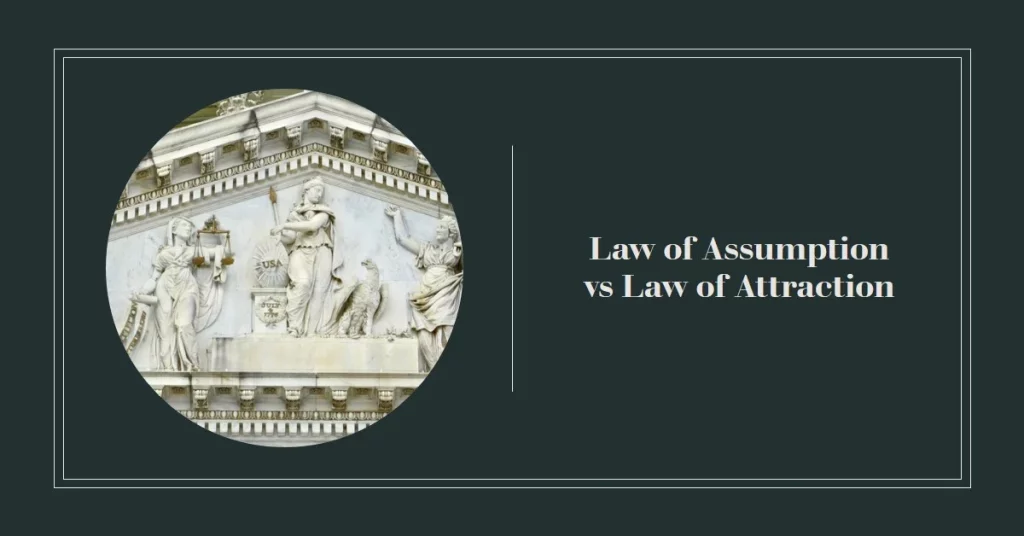Difference Between law of assumption vs law of attraction
The law of assumption vs law of attraction are two popular principles in the field of personal development and manifestation. While they both recognize the power of thoughts and beliefs in shaping our reality. Understanding the differences between these two philosophies can help us effectively utilize their potential for achieving our goals and desires.
The Concept and Distinction between the Law of Assumption and the Law of Attraction
Definitions

Law of Attraction is a universal that positive thoughts lead to positive experiences and negative thoughts lead to negative experiences. By focusing on your desires, you can attract them into your life.

Law of Assumption is the concept that involves manifesting what you want by believing that you already have it. Instead of focusing on the process of attracting, you simply assume that your desire is already a reality.
Examples
Law of Attraction: A person wants to improve their financial situation. By constantly focusing on their goal, visualizing themselves with a better financial life, and expressing gratitude, they attract opportunities and experiences that lead to financial abundance.
Law of Assumption: A person wants to find a loving partner. Instead of concentrating on the process of attracting a partner, they assume that a relationship already exists, feeling the emotions associated with being in a loving relationship. This assumption leads to a change in their behavior which attracts a suitable partner.
Comparison
- Energy Emission: Both laws are based on the idea that one’s thoughts and beliefs emit specific energy vibrations that attract experiences and circumstances. The Law of Attraction emphasizes the importance of aligning one’s thoughts with positive manifestations. The Law of Assumption employs the belief that by assuming the desired state exists, the universe will match the corresponding experience.
- Application: Both principles can be applied in various aspects of life, such as personal development, relationship building, and even product marketing. The Law of Attraction can help marketers focus on generating positive content that showcases the value and benefits of a product, while the Law of Assumption enables marketers to envision great success and align their strategies accordingly.
- Targeted Areas: The Law of Attraction targets specific desires or experiences, while the Law of Assumption emphasizes the belief that desires are already manifested. Both laws can be applied in different areas of life, such as career, relationships, health, and self-improvement.

Application Scenarios
- Product Marketing: By applying the Law of Attraction, businesses can focus on creating positive and valuable content to attract customers. On the other hand, utilizing the Law of Assumption in marketing encourages businesses to assume their products or services are highly successful, influencing their actions, strategies, and marketing messages to align with that belief.
- Relationship Building: The Law of Attraction helps individuals develop better relationships by focusing on positive thoughts and emotions when interacting with others. In contrast, the Law of Assumption encourages individuals to assume the desired outcome of their relationships and embody those feelings, which then results in authentic and meaningful connections.
- Personal Development: Both the Law of Attraction and the Law of Assumption can be harnessed as tools for personal growth. By focusing on positive thoughts with the Law of Attraction, individuals can attract desired circumstances into their lives. Meanwhile, the Law of Assumption promotes the belief in a desired situation as a reality, therefore altering one’s actions and mindset to align with this assumption.
Read More: Difference Between Molecular Distillation and Short Path Distillation
Advantages and Disadvantages
Law of Attraction
Advantages:
- Encourages positive thinking and emotional wellbeing
- Helps manifest experiences aligned with your desires
- Can bring more happiness and abundance into your life
Disadvantages:
- Might overemphasize the power of thoughts and potentially minimize the importance of taking action
- Manifestations can be unpredictable and sometimes slow
Law of Assumption
Advantages:
- Fosters clarity and focus on one’s desires
- Empowers an individual to take control of their reality by altering their assumptions Can bring quicker results and manifest desired outcomes
Disadvantages:
- Might lead to unrealistic expectations and disappointment if not done correctly
- Requires a great deal of faith and focus to make it work.
Differences Table
The following table highlights the key differences between the Law of Assumption and the Law of Attraction:
| Law of Assumption | Law of Attraction |
|---|---|
| Based on assuming and believing that your desires and wishes have already been fulfilled. | Based on the belief that positive thoughts attract positive experiences, while negative thoughts attract negative experiences. |
| Focuses on manifesting specific desires or outcomes by assuming they have already been achieved. | Focuses on attracting positive results in all aspects of life through positive thoughts and energy. |
| More specific and targeted in terms of manifesting desired outcomes. | More general in nature, encompassing all areas of life and experiences. |
| Founded by Neville Goddard and emphasizes the power of imagination and assumption. | Gained popularity through Rhonda Byrne’s book “The Secret” and encompasses various universal principles. |
| Places greater emphasis on the state of mind and perception rather than action. | Involves practices such as visualization, gratitude, affirmations, and reframing negative thoughts. |
| Implies that your imagination and assumptions can shape your reality. | Suggests that what you believe will happen in your life, but does not provide immediate solutions to problems. |
| Based on the idea that nothing happens outside your consciousness and there is no higher power. | Acknowledges the concept of free will and the influence of energy and thoughts on experiences. |







